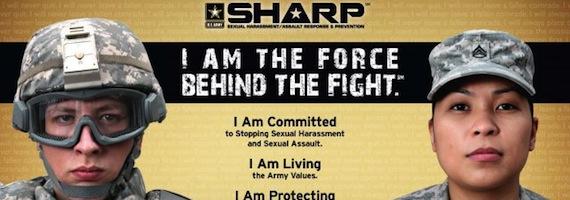It happened to Christina three different times, and as a result she couldn’t leave her bedroom for five years. It happened to Susan at home and at work during her surgery on base. It happened to Kate while stationed in Germany and post-traumatic stress disorder still plagues her. And it happened to Leigh after a senior NCO walked her to her barracks.
The first three Servicemembers reported it and lost their careers, the last never told anyone until I interviewed her.
None of the offenders have been punished.
It is military sexual assault (MST).
As a military journalist, I’ve interviewed and written articles on rape and military sexual assault in the Armed Forces. Most recently I did so with Army officials in charge of the new SHARP initiative (Sexual Harassment and Assault Response and Prevention) program that was implemented in response to the issue.
I’m also a military spouse whose soldier has served for 26 years, and I can attest that there are rotten apples in the ranks and across all branches. There are also those who serve gallantly and have given it their all. Unfortunately, the inherent characteristics that make some soldiers great in battle may also lead to deviant behavior at home.
The Army is facing the issue and attempting to combat MST, and there are numerous dedicated and passionate SHARP program managers on board. In fact, by the end of this fiscal year, Army battalions should have two Sexual Assault Response Coordinators (SARCs) and Victim Advocates (VAs). Progress is being made.
However, it’s not enough – at least not yet. As someone who has reported on both sides,
I know the issue is more grey than black or white.
At the most elementary level, what needs to change is the reporting structure for these crimes and the accompanying punishment. The fact is the estimated 26,000 sexually assaulted (female and male) servicemembers (i.e. one in four) who don’t report these incidents do so out of fear of retaliation, a general lack of faith in the military justice system, a lack of accountability by some commanders, and more importantly, the loss of their careers and credibility..
Until there’s a true zero tolerance reality with regard to Military Sexual Assault, until the authority is taken from commanders and the military code amended so that military and or independent prosecutors (or a combination of both) have control of all legal decisions in these cases, the problem will persist.
Until punishment relentlessly consists of (at a minimum) prosecution, reduction in rank, court-martial, dishonorable discharge and jail time (for offenders AND those who cover it up or support and protect them), most victims will not opt for unrestricted reporting of sexual assault.
The recent convictions and overturn of sexual assault in two Air Force cases where male officers were found guilty but their commanders overturned the judgments – are proof enough. Further, the punishment must fit the severity of the crime and be unyielding – towards officer or NCO, Army or Air Force, male or female offender.
Let’s not lose sight that rape and sexual assault is not just a military “epidemic.”
Sure, society expects a higher level of responsibility and holds the military to different standards because of what our soldiers do for a living and what they represent, but these men and women who are trained to protect our way of life also need protecting, too, and (no) it isn’t a sign of weakness.
Military families need to work together to support our servicemembers and the military. We also need to give military initiatives a chance (to evolve and adapt), and to speak up when we see something awry. We need to encourage our spouses to do the same, too, regardless of the perceived consequences.
Changing the culture will take time and a concentrated effort across the board. We also know that a balanced approach, tolerance and patience are needed to solve this social problem that follows many servicemembers in and out of the military.
In the meantime, let’s ensure that our military comprehends that new programs and initiatives, access to information and training, re-screening and re-credentialing, and slogans and mottoes don’t necessarily prevent sexual assault – enforcing the UCMJ does.
Corinne Lincoln-Pinheiro is a military journalist at Joint Base Lewis-McChord (JBLM), WA. She writes for the Ranger, the Northwest Airlifter, Northwest Veterans, and online magazines JBLM Singles and JBLM Spouses. She also writes a blog (http://rankandfile.blog.com) that highlights issues in the military community.









